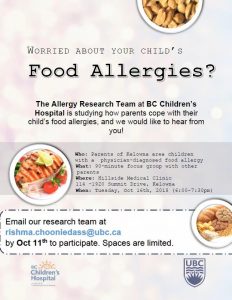Participate in a study on the cost of living with food allergy – deadline is October 31. And if you’re in Kelowna, BC you can participate in a food allergy focus group next week.
Plus, discover the latest in food allergy research. You’ll learn about how the immune system remembers food allergens, which new gene is associated with peanut allergy, and if fish and shellfish allergies resolve over time.
You can also check out this month’s mythbuster about whether eating small amounts of allergens will “cure” food allergy.
Research: Closing on October 31st – Cost of living study
 If you are an adult or parent/caregiver of a child with food allergy, you are invited to participate in a study looking at the costs involved in living with a food allergy.
If you are an adult or parent/caregiver of a child with food allergy, you are invited to participate in a study looking at the costs involved in living with a food allergy.
The results of this study will help inform organizations like ours on the economic impact of living with this medical condition. This allows us to advocate on your behalf to make positive changes within government and industry.
Your participation is crucial to providing the researchers with meaningful data. Please take a moment to complete the survey.
If you have already taken the survey, thank you for your input!
For details on the study and how to participate, click here.
Research: October 16 in Kelowna, BC – Food allergy focus group
The Allergy Research Team at BC Children’s Hospital is studying how parents cope with their child’s food allergies, and they would like to hear from you! Participate in a 90-minute focus group with other parents to share your experience with researchers.
- Who: Parents of Kelowna-area children with a physician-diagnosed food allergy
- Location: Hillside Medical Clinic, 114 -1920 Summit Drive, Kelowna, BC
- Date: Tuesday, October 16th, 2018 from 6:00 to 7:30 pm PDT
Email the research team at rishma.chooniedass@ubc.ca to participate. Registration has been extended from October 11th.
Hurry, spaces are limited!
Research: Study provides insight on how the immune system remembers food allergens
 A research team at McMaster University is studying why the body’s immune system responds inappropriately to certain foods and why some food allergies are lifelong.
A research team at McMaster University is studying why the body’s immune system responds inappropriately to certain foods and why some food allergies are lifelong.
AllerGen and Food Allergy Canada are two of the supporters of this very important research.
In their new paper published in the Journal of Allergy and Clinical Immunology, “The IgE Memory Reservoir in Food Allergy”, Drs Manel Jordana, Susan Waserman and Rodrigo Jiménez-Saiz, and PhD students Kelly Bruton and Joshua Koenig, shed light on how the immune system “remembers” food allergens.
A food allergy is an abnormal immune response to a food. The immune system mistakenly identifies a food as harmful and produces an antibody called immunoglobulin (IgE) E that binds to cells in tissues (mast cells) and in blood (basophils) through a specific receptor. The next time the food is consumed, the allergen (peanut, for example) binds to the IgE and triggers mast cells and basophils to degranulate, releasing molecules such as histamine that cause the allergic reaction.
“This improved understanding of how immune cells hold their memory provides us with new potential therapeutic targets for allergic diseases,” notes Dr. Jordana.
AllerGen is a national research network dedicated to improving the quality of life of people with allergic and related immune diseases.
Bonus: Dr. Jordana shared his insight with us last year in our ‘The science of food allergy’ webinar where he talked about the basic science behind food allergy. His presentation was one of the most popular webinars we have hosted. Watch his presentation now.
Research: New genetic clue to peanut allergy
 AllerGen has announced that Canadian researchers have pinpointed a new gene associated with peanut allergy, offering further evidence that genes play a role in the development of food allergies and opening the door to future research, improved diagnostics and new treatment options.
AllerGen has announced that Canadian researchers have pinpointed a new gene associated with peanut allergy, offering further evidence that genes play a role in the development of food allergies and opening the door to future research, improved diagnostics and new treatment options.
The gene, called c11orf30/EMSY (EMSY), is already known to play a role in other allergy-related conditions, such as eczema, asthma, and allergic rhinitis. This study is the first to associate the EMSY locus with food allergy, and these findings suggest that the gene plays an important role in the development of not just food allergy but also general allergic predisposition. The findings were published in The Journal of Allergy and Clinical Immunology.
Food Allergy Canada helped with this important research by partnering with McGill University and others in developing the Canadian Peanut Allergy Registry (CanPAR). The study analyzed DNA from 850 individuals with a peanut allergy recruited from CanPAR and nearly 1,000 individuals without a peanut allergy.
AllerGen is a national research network dedicated to improving the quality of life of people with allergic and related immune diseases.
Research: Study suggests that fish and shellfish allergies don’t usually resolve over time
 A recent Reuters article highlights research published in The Journal of Allergy and Clinical Immunology: In Practice noting that people rarely outgrow fish and shellfish allergies.
A recent Reuters article highlights research published in The Journal of Allergy and Clinical Immunology: In Practice noting that people rarely outgrow fish and shellfish allergies.
“Fish and shellfish allergy . . . accounts for the majority of life-threatening (anaphylaxis) reactions in adults but has attracted much less research attention than other food allergies, such as peanut,” notes senior study author Dr. Moshe Ben-Shoshan from Montreal Children’s Hospital, part of the McGill University Health Centre.
Food Allergy Canada helped with the recruitment of this important research.
Mythbuster: Is it true that when someone eats a little bit of the food they are allergic to, it will increase their tolerance to that food and they will be “cured” of that allergy?

Giving someone a little bit of their allergen (the food they are allergic to) is not safe. It is not the same thing that is being done in Oral Immunotherapy (OIT), which is medically supervised.
In OIT, patients attend a clinic where they are monitored by highly-trained professionals. After testing to ensure they qualify, the person is given a tiny amount of the food that causes them to react (such as peanut), and over a prolonged period of time the dose (amount of the allergen) is gradually increased.
The goal of OIT is to induce “desensitization”, where the person can eat more of the food without having an allergic reaction than they were able to prior to OIT. This is not the same as tolerance which is the “complete and permanent resolution of clinical response following exposure to any amount of the identified allergenic food.” OIT needs medical supervision and oversight because allergic reactions occur frequently.
Bottom Line: Giving someone a little bit of the food they are allergic to is not safe. This is different than Oral Immunotherapy, which is medically supervised.
Help us educate your communities and share this Mythbuster with them! Stay tuned for more Mythbusters to come.
Medical content reviewed by: Dr. Julia Upton, MD, FRCP(C) Clinical Immunology and Allergy
Check out our blog for other myths about:
- Age requirement for allergy testing
- Cooking at high temperatures kills allergen proteins
- “May contain” allergen labelling is mandatory
- Results of skin prick tests indicate severity of allergy
- Pesticides and other chemicals can trigger allergies
- Epinephrine auto-injectors cure food allergy
- Which allergens cause life-threatening reactions
- One food allergy being more serious than the other
- EpiPens being dangerous
- Using Benadryl
- Food allergy “cures”
- Celiac disease is the same as a wheat allergy

